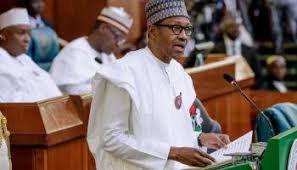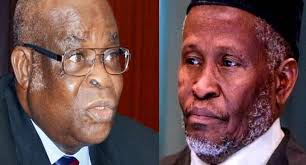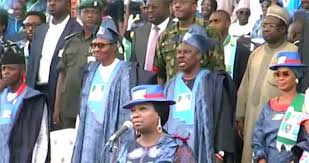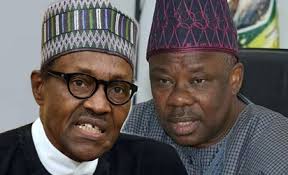News
300 CCSOs Appraise Insurgency War, Want Buhari’s Re-Election

A coalition of 300 Civil Society Organisations (CCSOs) has said that President Muhammadu Buhari had been successful in the counter-insurgency battles and deserves accolade and re-election.
The coalition enjoined Nigerians to re-elect President Buhari because of his success in the fight against insurgents as contained in the report of Centre of International and Strategic Studies (CISS).
CISS report on Thursday that President Muhammadu Buhari had been successful unlike the government of former President Goodluck Jonathan.
The coalition said it unanimously reached and adopted the positions and conclusions of CISS of the unbiased and truthful accounts and perspectives into insurgency in Nigeria operations and battles in the country.
“The CCSOs endorsed without hesitations the general conclusions of the report, which aligns with the consensus opinions among majority of Nigerians, including the incipient opposition elements in the country, traditionally obstinate in conceding to the administration of President Muhammadu Buhari’s successes of the counter-insurgency battles.’’
The position of the coalition is contained in Communiqué Issued After A Convention of Coalition of 300 Civil Society Organizations (CCSOs) in Abuja on Thursday which Conscientiously Scrutinized and Deliberated On the Report Titled “The Battle Against Terrorism in Nigeria: A Public Dossier On The War”.
According to the CCSOs, the report “ yawningly re-echoes that President Buhari has frenetically tackled the insurgency with so much vigour, energy and resources.
“It stamps that the President has made the difference in counter-terrorism combat and deserving of loud accolades and commendations.’’
The organissations anchored on the report made by Centre for International and Strategy Studies (CISS) Dated December 20, 2018 which they reviewed, assessed and appraised.
The communiqué was signed by Comrade Okpokwu Ogenyi, Chairman, Communique Drafting Committee; Mr. Mshelizza Yusuf, Secretary of Communique Drafting Committee; and Comrade Musa Nasiru, a member of the communiqué committee.
According to the communiqué, “the report vacated previously erroneous notions and fogs orchestrated by detractors to veil the successes of the counter-insurgency operations under the Buhari Presidency.
“It also rated as very high, the performance of the Nigerian Military, especially the Nigerian Army, under the leadership of the COAS Lt. TY Buratai who is also the leader of the counter-insurgency.
“For the benefit of Nigerians yet to read the report on combat of terrorism in Nigeria under the preceding and incumbent governments in Nigeria, as compiled by the Centre for International and Strategy Studies, the CCSOs have burdened themselves to highlight a few areas for emphasis.
“The CISS report resoundingly reechoed that on assumption of office by President Buhari on May 29, 2015, Boko Haram terrorists had violently seized, occupied and dislodged natives in several local governments areas in the Northeast.
“The insurgents exercised unchallenged traditional and religious leadership of these communities by establishing its brand of Islamic Caliphate.
Excerpts from the CISS report emphasized that a BBC report of September, 20, 2014 that Boko Haram militants were in charge of at least 25 towns and villages in Northeast Nigeria , the region’s Roman catholic Bishop has claimed, warning of a deteriorating security situation.
Bishop Oliver Dashe said, 10 towns in Yobe state, the same number in Borno and five in Adamawa had fallen to the rebels over the last month, as they seek to carve out a hardline Islamic State.”
“Furthermore, the report elucidated that by the end of 2014 under the Jonathan Presidency, Boko Haram had “ Before the declaration of state of emergency, Boko Haram had overpowered local administrators and law enforcement in Northern Borno close to Nigeria’s border with Cameroun, Chad and Niger and taken over Marte, Magumeri, Mobbar, Gubio, Guzamala, Abadam, Kukawa, Kaga, Nganzai and Mungono LGAs. After the declaration and the massive deployment of soldiers to the region, Boko Haram continued to operate relatively freely and seized additional seven LGAs.”
CCSOs noted with a sense of responsibility that the Jonathan Presidency could not arrest the drift and intensification of insurgents conquest of Nigerian territories.
President Buhari inherited a country, whose no fewer than 24 LGAs were firmly under the total control and administration of Boko Haram terrorists.
Excitingly, the Buhari Presidency has reclaimed every territory previously held by insurgents as far back as 2016.
The CISS report, they said acknowledged President Buhari’s attention, strictness and victories against Boko Haram terrorists.
CISS said: “Among the earliest acts in office was to replace the heads of the army, navy and air force. The new army chief and the commanding officer in charge of operations against Boko Haram both hail from Northern Nigeria and by many accounts, they have taken a more proactive approach than their predecessors toward countering the group.”
Additionally, the report says; “Today, Muhammadu Buhari administration has achieved much when pitched in direct comparison with efforts of the former regime to manage the insecurity menace in the Northeastern region of the country where insurgency has thrived over the years.”
The CISS report identified Mr. President’s hard stand against corruption, which hitherto rocked the Nigerian Military, frustrated and weakened the battle against insurgency, as reason for his success. Buhari’s insistence on transparency and accountability in the prosecution of the war were added ingredients.
“President Muhammadu Buhari’s agenda against corruption has ultimately resulted in more transparency and accountability in the prosecution of the war against the Boko Haram insurgency.”
The CISS report proceeded to chronicle several incidents of successes and victories against Boko Haram insurgents under President which were before mere dreams, but have become the subject of malicious denials by political persecutors of President Buhari.
The report observed that the Buhari Presidency achieved remarkable triumph over terrorists evidenced by “Creating suitable conditions for the safe return of the more than two million people displaced by Boko Haram’s violence has been ongoing since 2015. In early 2016, President Buhari appointed a new committee led by a retired general, to oversee its reconstruction and development program for the Northeast.
Independently, CISS also reiterated isolated milestones in the terrorism combat under President Buhari, which have been in public domain.
“These include, either the arrest of Boko Haram top commanders by the Nigerian Army or their deaths during fierce battles with Nigerian troops, such as namely Audu Ahmadu, a Boko Haram engineer who repairs automobiles; Abu Rajal and Tuja Sa’inna Banki and Abu Nazir who had been on military’s wanted list.
“Securing freedom for a greater number of the abducted Chibok and Dapchi schoolgirls and tens of thousands of other Nigerians held hostage by terrorists and the capture of Sambisa forest in Borno have been reflected in the report.
“It applauded the Gen. Buratai’s excellent Civil/Military Relations which he deployed positively in currying support of the populace to battle the asymmetric terrorism war. And Army Chief’s establishment of the Nigerian Army Call center and Human Rights Desk in all Army Divisions in addressing issues of human rights abuses by its personnel have been brought to the fore.
The report expatiates; “… the groups (Boko Haram sects) decline is also the result of multiple processes at the regional and local level. The new administration was pivotal in coordinating regional and international response to Boko Haram, persuading the US to sell arms to Nigeria again and working closely with regional states involved in the fight.”
“Therefore, the CCSOs are ennobled by this report to state empathically that Nigerians should not allow a reversal of the gains recorded against Boko Haram terrorism under the current administration by siding with selfish political jobbers and power mongers to oust President Buhari in 2019. If Nigerians allow this conspiracy and gang-up to work in favour of the plotters, terrorism will again assail the nation more fiercely than experienced prior to the Buhari Presidency.
“Nigerians are persuaded to endorse and work assiduously for the re-election of President Buhari for a second term in office to finally lay to rest, the ghost of terrorism in Nigeria. A deviation from this trajectory would be disastrous.
The CCSOs commended the Centre for International and Strategy Studies (CISS) for their diligence, accuracy and time devoted to this energy-sapping report, spanning the period of 2013-2018.
“Certainly, the CCSOs adjudged it as a priced document worthy of attention by all Nigerians and indeed, members of the international community in search of an unbiased and truthful accounts and perspectives into insurgency in Nigeria operations and battles in the country.
“We have no doubt about the issues articulated in the report as reflective of Nigeria’s several years of struggle with the Boko Haram terrorism, reflecting its evolution, its rise, government responses to the insurgency under the regimes of former President Goodluck Jonathan and the incumbent President Muhammadu Buhari, foreign interventions/ aids and local involvement in the fight as well as the performance of the Nigerian Military in exacerbating or blighting the fires of the terrorism scourge on Nigeria. ‘’












